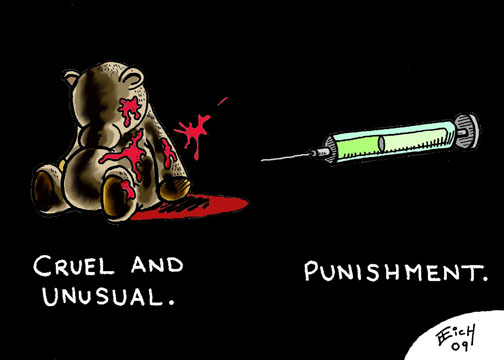“Stick him again,” seemed to be the mantra of the Ohio execution team when it unsuccessfully poked convicted murderer Romell Broom full of holes last month. The executioners tried for two hours to put Broom to death, but they couldn’t find a vein.
Imagine the delight of sadistic witnesses when one of the lethal injections pierced Broom’s anklebone. “Sixteen, and counting,” the state-appointed swordsman surely announced as Broom cried out in pain.
In the final tally, the executioner jabbed Broom 18 times and he survived.
Ohio is now in a legal quandary. Ohio Gov. Ted Strickland granted the man convicted of raping and killing a 14-year-old girl in 1984 a temporary reprieve so the Ohio Department of Rehabilitation and Correction can review the attempted execution.
Although Broom’s attorney seeks to block another execution attempt, it’s not because of his moral convictions against capital punishment as much as it is about the constitutionality of the method being used — lethal injection.
Is lethal injection cruel and unusual punishment? Does it violate the Eighth Amendment? Those are the questions being posed in considering how to do Broom in — again.
Ohio isn’t the first, or only, state forced to do some collective soul searching about the humaneness of putting somebody to death with poison.
California and North Carolina have imposed what amounts to a moratorium on the death penalty while lethal injection is reviewed. Maryland also suspended the death penalty until it can discern whether lethal injection is cruel and unusual punishment. Maryland’s issue is less about the Eighth Amendment, though. As in most of the 35 states that still practice this barbaric ritual, Maryland worries more about having to have prison employees deliver the final blow.
Physicians flat out refuse to give the fatal shots because it violates the Hippocratic oath to save lives.
In fact, execution, rather than confinement in prison for life, is the easy way out for the convicted. It’s the society that suffers each time we put somebody to death for their atrocious acts of violence.
Despite the fact that a piece of each human dies when a society takes a life in retribution, we continue to attend the dance; insisting the death penalty works to ward off other murders.
Hanging was once the American method of choice. Fortunately, we didn’t bring the guillotine from Europe. When the public spectacles were seen as being too ookie, we closeted the hangman’s noose in favor of the firing squad, lethal gas and electrocution.
Eventually, those methods were mostly abandoned — although a few states like South Carolina still strap ‘em and zap ‘em in the chair — and we went to the needle. It appealed to our delicate nature to just put the criminal to sleep with drugs and poison.
We’re not squeamish about killing our crooks in the U.S. as long as it’s done nice and clean and we don’t have to watch, unless it’s a movie like “The Green Mile.” We don’t want them tortured to death — even though our best practices really are torture. There just doesn’t seem to be a pretty way to kill people. As hard as professionals try, they can’t come up with a sanitized execution.
It’s a tragic irony that our country can’t seem to see the forest for the trees on the capital punishment debate. The death penalty is not punishment; it’s revenge, plain and simple. As sympathetic as we wish to be for surviving family members, nothing is gained when a progressive society goes medieval and whacks its crooks.




